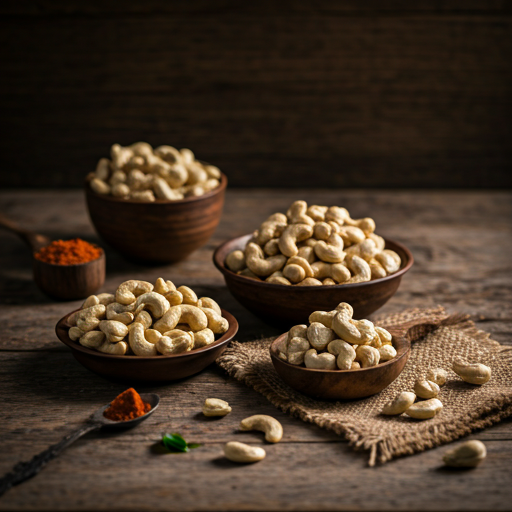Jeedipappu, known as cashew nut in English, is a beloved ingredient in many cuisines worldwide. This kidney-shaped seed, derived from the cashew apple, is prized for its rich, creamy texture and nutty flavor. Originating from Brazil, cashew trees were introduced to India by Portuguese traders, and today, India is one of the largest producers and exporters of cashews globally.
Cashews are a staple in Indian households, used in sweets, curries, and snacks. Whether consumed raw, roasted, or ground into a paste, cashews add a unique taste and nutritional value to a variety of dishes. Let’s dive into the world of Jeedipappu, exploring its benefits, uses, and nutritional profile.
Nutritional Profile of Jeedipappu (Cashew Nut)
Cashews are nutrient-rich and provide an excellent source of healthy fats, vitamins, and minerals. Here’s what 100 grams of cashews roughly contain:
- Calories: 553
- Protein: 18 grams
- Fat: 44 grams (mostly unsaturated fats)
- Carbohydrates: 30 grams
- Fiber: 3.3 grams
- Vitamin E: 0.9 mg
- Vitamin K: 34.1 mcg
- Magnesium: 292 mg
- Copper: 2.2 mg
- Zinc: 5.8 mg
- Iron: 6.7 mg
Cashews are low in sugar and provide a good mix of protein, healthy fats, and essential minerals, making them a wholesome addition to any diet.
Health Benefits of Jeedipappu (Cashews)
Supports Heart Health:
Cashews are rich in monounsaturated fats and polyunsaturated fats, which help reduce bad cholesterol (LDL) and increase good cholesterol (HDL). This improves heart health and reduces the risk of cardiovascular diseases.Boosts Bone Strength:
Cashews are a good source of magnesium, phosphorus, and calcium, all essential for maintaining healthy and strong bones. The presence of vitamin K further aids in bone health by supporting calcium absorption.Enhances Brain Function:
The presence of healthy fats and minerals like zinc and iron in cashews promotes better brain function and prevents cognitive decline. Cashews are often considered a “brain food” due to their nutrient density.Rich in Antioxidants:
Cashews contain powerful antioxidants such as tocopherols and polyphenols that protect the body from free radical damage, reduce inflammation, and lower the risk of chronic diseases.Promotes Healthy Skin:
Cashews are high in copper, which is essential for producing melanin, the pigment that gives skin its color. Copper also aids in collagen production, keeping the skin firm, smooth, and youthful.Helps with Weight Management:
Although calorie-dense, cashews can support weight management when consumed in moderation. Their combination of protein, healthy fats, and fiber helps keep you feeling full, reducing the likelihood of overeating.Improves Eye Health:
Cashews are rich in lutein and zeaxanthin, antioxidants that protect the eyes from harmful UV rays and reduce the risk of age-related macular degeneration.Supports Immunity:
The presence of zinc in cashews helps boost the immune system, making the body more resilient against infections and illnesses.
Culinary Uses of Jeedipappu (Cashews)
Jeedipappu is a versatile ingredient that can be incorporated into both sweet and savory dishes. Here’s how cashews are used in the kitchen:
In Indian Curries:
Cashew paste is often used as a thickening agent in rich gravies like korma or butter chicken, adding a creamy texture and a slightly sweet flavor.In Sweets:
Cashews are a key ingredient in traditional Indian sweets like kaju katli, payasam, and halwa. They’re also used as garnishes for desserts such as gulab jamun and laddus.As Snacks:
Roasted cashews, either salted or spiced, make for a delicious and healthy snack. They are a great alternative to processed snacks and can be enjoyed any time of the day.In Baking:
Cashews are commonly used in baked goods, such as cookies, cakes, and brownies, for added crunch and flavor.In Salads and Stir-fries:
Cashews can be added to salads and stir-fried dishes for extra texture and nutritional value. They pair well with vegetables, chicken, and seafood.Cashew Butter and Milk:
Cashew butter is a creamy spread that can be used on toast or in smoothies, while cashew milk is a dairy-free alternative used in beverages and recipes.
How to Store Cashews
To maintain their freshness and prevent rancidity, store cashews in an airtight container in a cool, dry place. If you live in a humid climate, consider refrigerating or freezing them to extend their shelf life.
Things to Keep in Mind
Moderation is Key:
While cashews are nutritious, they are also high in calories and fats. Consuming them in moderation is important, especially if you’re watching your weight.Allergies:
Some people may be allergic to cashews. If you experience any allergic reactions, such as itching, swelling, or difficulty breathing, discontinue use and consult a doctor.Raw Cashews:
Raw cashews sold in stores are often steamed to remove a toxic substance called urushiol, which can cause skin irritation. Always ensure your cashews are properly processed before consuming.
Conclusion
Jeedipappu (cashews) are a powerhouse of nutrition and flavor. Whether you enjoy them as a snack, use them to enhance your dishes, or savor them in traditional sweets, cashews offer a wealth of health benefits that make them a valuable addition to your diet. Their creamy texture and nutty flavor add richness to recipes, while their nutrient density supports overall well-being.
So, the next time you reach for a handful of nuts, choose Jeedipappu and relish the goodness of this versatile and healthy superfood!

